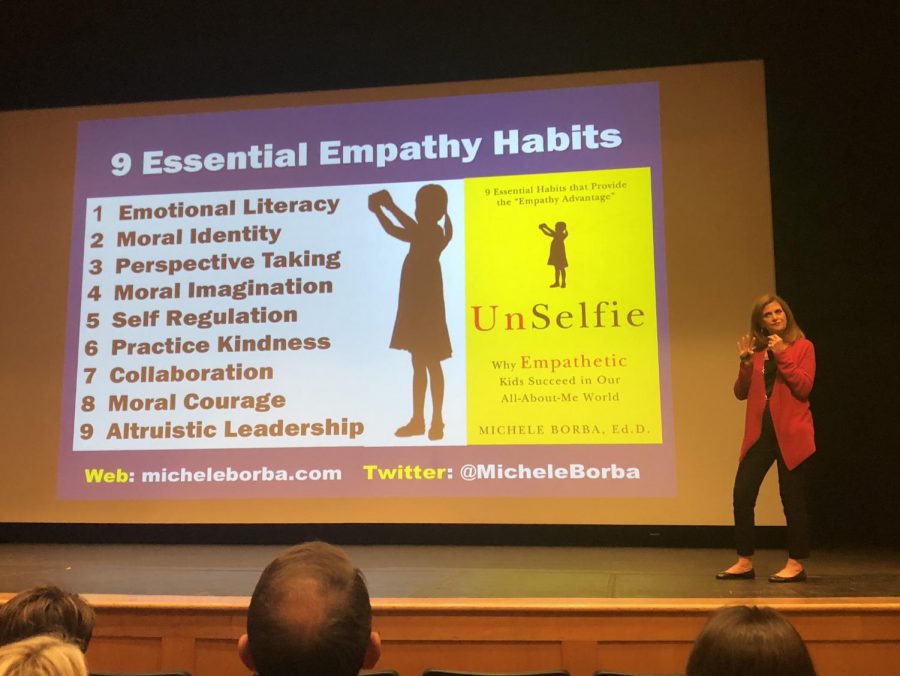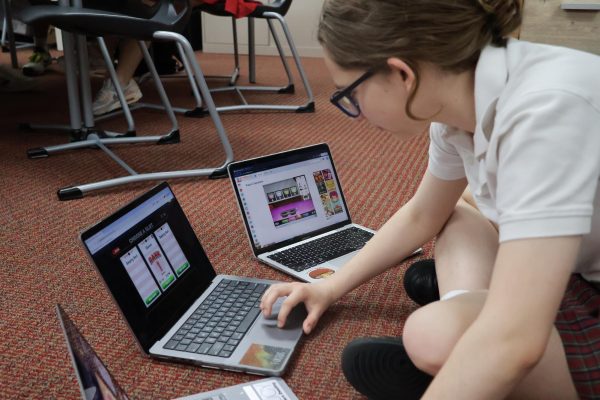Visiting psychologist stresses importance of empathy, effects on mental health
Psychologist Michele Borba spoke to parents on Oct. 16 about the importance of empathy and its effects on children’s stress levels.
November 15, 2018
After Ian O’Gorman was diagnosed with cancer in fifth grade, he was afraid to go back to school. However, his concern wasn’t about chemotherapy or even the cancer itself — his fear was centered around judgement from students because of his lack of hair after undergoing treatment.
His best friend, Ryan, took matters into his own hands and got every boy from his class to shave their heads in support of O’Gorman, who attended Lake Elementary School.
O’Gorman’s story is one of the many empathetic anecdotes that educational psychologist Michele Borba shared with faculty and parents on Oct. 16. Borba, the author of Unselfie, outlined nine steps to cultivate empathy in children and its correlation to their future success.
During her visit, Borba toured St. John’s and visited classes as she does with schools all over the country. Students across campuses have asked her for advice on how to destress, to which she recommends practicing mindfulness as a ritual until it becomes a habit. She provided parents with examples of hobbies students find relieving such as music, reading, technology detox, yoga and exercising.
Borba said that stress and anxiety levels in students have been continuously rising across the U.S.
“We have a crisis that’s unprecedented in the United States of America. Mental health needs are up, stress levels are up, and we’re finding kids who say they’re overwhelmed,” Borba said. “I’ve worked on six continents, and I’ve never seen this crisis in any other place as duplicated as us.”
The results of 72 different studies of American college students conducted between 1979 and 2009 found a 58 percent increase in teenage narcissism and a 40 percent decrease in empathy. Borba expressed her concern about the growing rates of anxiety and stress in all kids; the college scene is one element being examined due to freshmen arriving with already heightened stress levels.
“When stress builds, there is a direct correlation with empathy, which dials down in order to deal with the stress levels,” Borba said.
Along with empathy, character and moral identity have also been decreasing in recent generations. Borba attributes this to reasons such as celebrity idolism, the increase in wealth and technological advancements, a hyper-push on competition and decline in face-to-face contact between kids.
According to Borba, vital characteristics such as empathy are rapidly diminishing in children each generation and need a “moral rudder” to prevent the loss of these essential traits. Instead, kids are developing the “Mean World Syndrome,” or a very pessimistic outlook on the world. She explained this to parents by connecting children’s views of the world to the constantly negative news being broadcasted.
“Watch the kind of news that’s breaking,” Borba said. “They’re horrific images you can’t escape. In the olden days, you could turn off the TV, but now you can’t — they’re on the cell phones.”
Nowadays, children are raised in a global, diverse world, but people often empathize with those similar to them in aspects such as gender, age, race, culture and income. In order to become accustomed to this diversity, Borba says children must extend empathy to everyone, regardless of their backgrounds.
“We need to get them to feel comfortable outside of their comfort zone and widen their empathy circles,” she said.
For nine essential empathy habits, be sure to check out Fareen’s sidebar in the Nov. 13, 2018 issue of The Review!
























